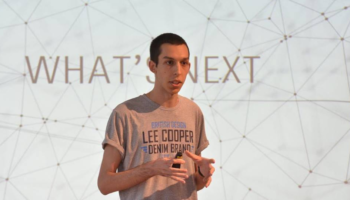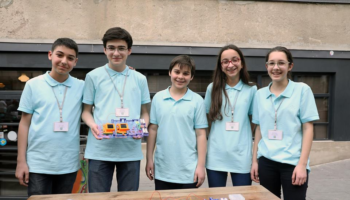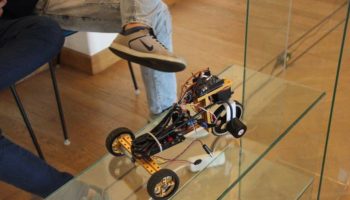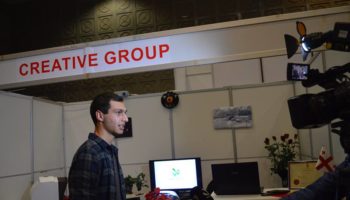Since 2001 Peace Corps operates in Georgia. Peace Corps aims to promote World peace and friendship.
Peace Corps began its work in Georgia with the English Education program. In the framework of this program, American volunteers along their counterparts teach English in the regional schools. This program is still working successfully and more than 2000 volunteers did their bit in the development of communication skills in English language, teaching methods and resources.
Peace Corps Georgia runs two other programs as well. We Talked about these with Peace Corps Country Director, Steph Smith
-First, let us talk about the mission and aims of the organization. Which spheres are you interested in?
-Peace Corps was established in 1961 by the president of the United States John Kennedy. Currently Peace Corps operates in 64 countries promoting peace, providing technical assistance, helping people outside the United States to understand American culture, and helping Americans to understand the cultures of other countries. In Georgia Peace Corps has been working for 16 years. In any country Peace Corps starts working after being invited by the government and its will is very important. We cooperate with the ministries of Education and Science and Sports and Youth Affairs. Our aims are improving English language skills, implementing improved teaching methods and practices, developing resources and improving access to education. Thus, the biggest is the English Education Program. We have other programs as well, which are focused on youth and organizational development, as well as awareness building. The mission of Peace Corps is to provide qualified human resources to the interested countries.
–Mainly Peace Corps works in three directions – which are these directions and what are the results?
-In order to improve methods and approaches every year we do surveys and try to analyze our impact and results. Survey results are positive. Currently, Peace Corps Volunteers in Georgia work in three directions: English Education, Individual and Organizational Development and Response Program. Mainly volunteers are placed in the regions. Since 2001, we have been working with Georgian partners at schools, organizations and communities all over the country.
-How are American teachers selected and trained?
-It is not required to be professional. Each program has its criteria, but main is to have enthusiasm and wish to help others selflessly. It is very interesting that applicants do not know exactly in which country they will serve. After being accepted and placed in particular country, different kinds of trainings are held for them during 3 months. They get familiar with Georgian culture and teaching specifics, and they learn Georgian language. Most of all Volunteers are placed in small villages, where the need of assistance is higher. For two years, they leave in Georgian families. Volunteers might come from any state. This year’s group represents 32 states and most of all California. As of age, majority is young 20-29 year old, though we have older Volunteers as well, for example 75 year old. According to statistics of 2016, overall 179 volunteers worked in 10 regions of Georgia.
-While being in Georgia how do Volunteers participate in social life?
-Volunteers actively take part in social life. Some of them speak Georgian. They learn Georgian history, culture and they celebrate holidays. While being in Georgia they become goodwill ambassadors of Georgia by sharing their love of Georgia and Georgian culture to American via emails, blogs and websites. One of our volunteers in Imereti started learning poems of Galaktioni in order to learn Georgian culture even better.
-What are the teaching methods and how are Georgian students and teaching mastering the materials?
-English Education Volunteers along their Georgian colleagues try to develop English language skills for communication purposes. Volunteers and their counterparts develop critical thinking skills and raise awareness about gender issues. It is worth noting that extracurricular activities are held very often. Volunteers organize camps, different competitions and start clubs. In 2016, 7940 students attended formal lessons of English language, of which 5655 improved speaking, listening, writing and reading skills in English language. As for teachers, 189 teachers improved English communication skills.
-One of the directions is supporting organizations. What are the aims of the Individual and Organizational Development project?
-This project started in 2004 and promotes activities of individuals and organizations all over the country. Project helps Georgian citizens, especially youth, women and socially vulnerable population to improve their economic circumstances. Volunteers along their Georgian colleagues work in support of nonprofit, nongovernmental and governmental organizations, as well community groups, sustainable projects and programs. They also promote financial literacy and support development of employability skills. Volunteers and their counterparts organize different trainings and seminars. In 2016, 45 volunteers served in the framework of this program.
-What is the Response program about?
-In the framework of this program, Volunteers arrive with considerable experience and exceptional technical skills. They volunteer from 6 to 12 months. Main directions are organizational capacity development by means of management, fundraising, communication, etc, as well as individual development, English Education and improvement of professional skills of teachers.
-In partnership with USAID Peace Corps has Small Project Assistance program in support of local community development. In 2016, 9743 USD was spent, 38 projects were planned and implemented. Peace Corps promotes an understanding between Georgian and American people.
-How actively are you involved in the science development?
-Peace Corps aims to raise awareness about technologies in individuals and promotes technological development in classrooms, schools, organizations and communities. In 2015, Peace Corps Georgia launched girls empowerment initiative, which serves reinforcement of girls education and gender equality. The project already had 2000 beneficiaries. Apart from this, there are different writing contests and competitions held, both locally and internationally. We are going to keep going down this path. As for summer camps, on this season, more than 200 youth had chance to participate around Georgia. Among those camps there were GLOW Camp (girls leading our world), LIFE (Leadership, Integration, Fitness, through Education) Camp, BUILD ( Boys United in Leadership Development) Camp and SELF (Self Esteem through Leadership and Fitness)
METS (Math, Engineering, Technology and Science) Camp is interesting for its science direction. There girls and boys have access to different sciences and analyze how might math, engineering and technologies impact their lives and future.
-As for future plans, are any changes planned?
-We want to follow the path we have taken. We aren’t going to stop our projects. In the contrary, we hope to deepen our partnership and to have the local support.
Author: Natalia Jalaghonia
The Hall of Young Scientists & Analysts – “Doctrina”








